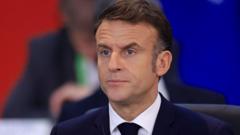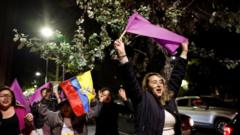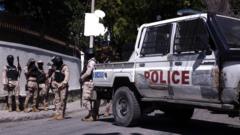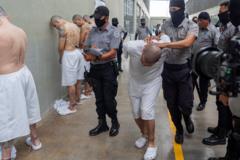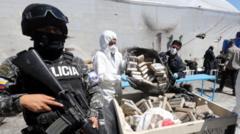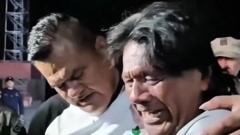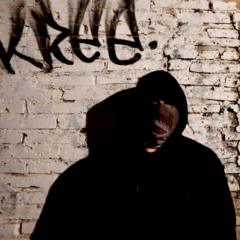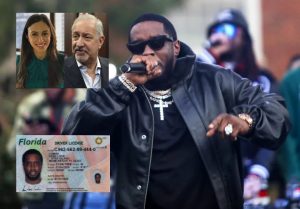Ecuador, once an unsuspecting exporter, faces a shocking rise in drug-related violence and trafficking due to increasing European demand for cocaine.
**Escalating Cocaine Trafficking: The Unseen Crisis in Ecuador and Europe**
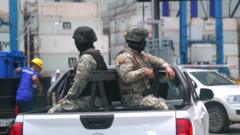
**Escalating Cocaine Trafficking: The Unseen Crisis in Ecuador and Europe**
The plight of Ecuador as a central hub for cocaine shipment to Europe reveals the complexities of global drug trade dynamics.
As Ecuador finds itself at the epicenter of a burgeoning coca trade, the nation grapples with a crippling surge of violence and cartel influence. César, a 36-year-old from the Latin Kings gang, reveals harrowing details about the Albanian mafia’s tightening grip on cocaine trafficking routes from South America to Europe. Expressing the dire consequences of ignoring their threats, he candidly admits, "If you don't accept, they kill you." With 70% of the world's cocaine currently flowing through Ecuador’s ports, as noted by President Daniel Noboa, the country is increasingly catching attention, despite its lack of domestic cocaine production.
The Albanian mafia, flourishing amid Ecuador’s economic strife post-Covid, has become a dominant force in the drug trade. Gangs work relentlessly to transport cocaine smuggled from Colombia and Peru, employing various methods such as infiltrating regular cargo, breaking into port containers, or even attaching drugs to vessels at sea. This stark reality intensifies with alarming murder rates; January 2025 reported an unprecedented 781 killings—mostly linked to drug trafficking.
A truck driver named Juan, who unknowingly transported illicit goods, shared his chilling experience of nearly becoming collateral damage in the booming drug trade. He warns of the increasing danger posed by what he calls "container contamination," as volumes shift from kilos to potentially tonnes—pointing to a dangerous rise in drug shipments powered by consumer demand in Europe. Meanwhile, banana exports serve as a convenient cover, disguising the illicit cargo beneath legitimate goods.
As the number of seizures reach record highs—nearly 300 tonnes last year—the response from Ecuador’s police force is strained but resolute. Major Christian Cozar Cueva admits there’s been a significant increase in cocaine bound for Europe. However, many acknowledge the cycle cannot be broken without addressing the root cause: rising demand among consumers in countries like the UK. The UK stands as the leading cocaine consumer in Europe, with its market valued at an estimated £11 billion ($14.2 billion).
Prosecutors urge European nations to reassess the dynamics of drug consumption, emphasizing that tackling demand is crucial to impeding cartel operations. The current crisis has far-reaching implications for Ecuadoreans— not only are lives lost in this perilous trade, but entire communities suffer as the economy falters under the shadow of growing cartel influence.
Similar sentiments resonate with President Noboa, who prioritizes tackling such violence and seeks support to break this deadly cycle. “The chain that ends in 'UK fun' involves a lot of violence," he asserts, highlighting the broader responsibility of consumer countries in the fight against drugs.
The Albanian mafia, flourishing amid Ecuador’s economic strife post-Covid, has become a dominant force in the drug trade. Gangs work relentlessly to transport cocaine smuggled from Colombia and Peru, employing various methods such as infiltrating regular cargo, breaking into port containers, or even attaching drugs to vessels at sea. This stark reality intensifies with alarming murder rates; January 2025 reported an unprecedented 781 killings—mostly linked to drug trafficking.
A truck driver named Juan, who unknowingly transported illicit goods, shared his chilling experience of nearly becoming collateral damage in the booming drug trade. He warns of the increasing danger posed by what he calls "container contamination," as volumes shift from kilos to potentially tonnes—pointing to a dangerous rise in drug shipments powered by consumer demand in Europe. Meanwhile, banana exports serve as a convenient cover, disguising the illicit cargo beneath legitimate goods.
As the number of seizures reach record highs—nearly 300 tonnes last year—the response from Ecuador’s police force is strained but resolute. Major Christian Cozar Cueva admits there’s been a significant increase in cocaine bound for Europe. However, many acknowledge the cycle cannot be broken without addressing the root cause: rising demand among consumers in countries like the UK. The UK stands as the leading cocaine consumer in Europe, with its market valued at an estimated £11 billion ($14.2 billion).
Prosecutors urge European nations to reassess the dynamics of drug consumption, emphasizing that tackling demand is crucial to impeding cartel operations. The current crisis has far-reaching implications for Ecuadoreans— not only are lives lost in this perilous trade, but entire communities suffer as the economy falters under the shadow of growing cartel influence.
Similar sentiments resonate with President Noboa, who prioritizes tackling such violence and seeks support to break this deadly cycle. “The chain that ends in 'UK fun' involves a lot of violence," he asserts, highlighting the broader responsibility of consumer countries in the fight against drugs.

